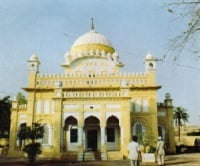Template:AOW276: Difference between revisions
Hari singh (talk | contribs) mNo edit summary |
Hari singh (talk | contribs) No edit summary |
||
| Line 4: | Line 4: | ||
'''[[Gurdwara Mal ji sahib]]''' is in [[Nankana Sahib]], [[Pakistan]] and near the local railway station but closer to this famous town associated with the founder of [[Sikhi]], [[Guru Nanak]]. Mal (also called jal and van) is a shady tree. | '''[[Gurdwara Mal ji sahib]]''' is in [[Nankana Sahib]], [[Pakistan]] and near the local railway station but closer to this famous town associated with the founder of [[Sikhi]], [[Guru Nanak]]. Mal (also called jal and van) is a shady tree. | ||
It is said that once as [[Rai Bular]] was riding among the fields in this area, he saw young [[Nanak]] sleeping in the shade of a mal tree | It is said that once as [[Rai Bular]] was riding among the fields in this area, he saw young [[Nanak]] sleeping in the shade of a mal tree. | ||
What struck [[Rai Bular]] was that the shade of the tree had not moved away from the sleeper as the movement and position of the sun warranted. | |||
This Gurudwara, too, was first built by [[Diwan Kaura Mal]] and renovated by [[Maharaja Ranjit Singh]]. It is larger and more imposing than Kiara Sahib with its broad copings mounted with domelets around the central dome, domed kiosks at the corners of the roof and porches on the sides of the hall.<!--- | According to another version, the shade had moved away from the [[Guru]] but a large cobra had spread its huge hood over his face so that his sleep was not interrupted. This miracle and the incident related to [[Kiara Sahib]] convinced [[Rai Bular]] of the spiritual eminence of [[Guru Nanak Dev]] whose devotee he became. | ||
This [[Gurudwara]], too, was first built by [[Diwan Kaura Mal]] and renovated by [[Maharaja Ranjit Singh]]. It is larger and more imposing than Kiara Sahib with its broad copings mounted with domelets around the central dome, domed kiosks at the corners of the roof and porches on the sides of the hall.<!--- | |||
This place is presently situated amidst the thick population of [[Nanakana Sahib]]. After partition, unfortunately, Sri Guru Granth Sahib has not been ceremoniously opened. Anyhow a portrait of the Guru is placed at the sanctum sanctorum, where the pilgrims pay a visit.--->{{aowf|Gurdwara Mal ji sahib}} | This place is presently situated amidst the thick population of [[Nanakana Sahib]]. After partition, unfortunately, Sri Guru Granth Sahib has not been ceremoniously opened. Anyhow a portrait of the Guru is placed at the sanctum sanctorum, where the pilgrims pay a visit.--->{{aowf|Gurdwara Mal ji sahib}} | ||
Revision as of 17:48, 10 November 2011
Gurdwara Mal ji sahib is in Nankana Sahib, Pakistan and near the local railway station but closer to this famous town associated with the founder of Sikhi, Guru Nanak. Mal (also called jal and van) is a shady tree.
It is said that once as Rai Bular was riding among the fields in this area, he saw young Nanak sleeping in the shade of a mal tree.
What struck Rai Bular was that the shade of the tree had not moved away from the sleeper as the movement and position of the sun warranted.
According to another version, the shade had moved away from the Guru but a large cobra had spread its huge hood over his face so that his sleep was not interrupted. This miracle and the incident related to Kiara Sahib convinced Rai Bular of the spiritual eminence of Guru Nanak Dev whose devotee he became.
This Gurudwara, too, was first built by Diwan Kaura Mal and renovated by Maharaja Ranjit Singh. It is larger and more imposing than Kiara Sahib with its broad copings mounted with domelets around the central dome, domed kiosks at the corners of the roof and porches on the sides of the hall. .....More

